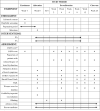Electroacupuncture versus sham electroacupuncture in treating low anterior resection syndrome after rectal cancer surgery: Study protocol for a randomized controlled trial
- PMID: 40737250
- PMCID: PMC12310008
- DOI: 10.1371/journal.pone.0329035
Electroacupuncture versus sham electroacupuncture in treating low anterior resection syndrome after rectal cancer surgery: Study protocol for a randomized controlled trial
Abstract
Purpose: Low anterior resection syndrome (LARS), a frequent postoperative complication of rectal resection, has been shown to significantly impact patients' quality of life. Electroacupuncture (EA), a non-pharmaceutical treatment, ameliorates gastrointestinal symptoms and promotes bowel movement. However, high-quality clinical evidence is lacking. This study aimed to determine whether EA can improve LARS symptoms compared with sham electroacupuncture (SA).
Study design and methods: This multicenter, randomized, sham-controlled clinical trial will be carried out across the outpatient clinics of three tertiary medical centers in China. A total of 136 patients with LARS who meet the inclusion criteria will be randomly allocated, in equal proportions (1:1), to either the EA or SA group. Each patient will undergo treatment three times weekly during the first four weeks and twice-weekly sessions over the subsequent four weeks. After the intervention, a 24-week follow-up period will be conducted. The primary outcome is the change in the LARS score from baseline to the end of week 8. Secondary outcomes include changes in the LARS score at other time points, response rate of patients showing reduced defecation dysfunction, subjective distress related to intestinal symptoms, Wexner Diarrhea score, Bristol Bowel Diary, EORTC-QLQ-C30 Quality of Life Questionnaire, and Fecal Incontinence Quality of Life Scale.
Discussion: This study will provide evidence of EA from multiple perspectives, investigate its potential application in LARS after rectal cancer surgery, and guide the development of therapy tailored to meet specific individual health needs.
Ethics and dissemination: Ethical approval for this study was granted by the Ethics Committee of Beijing University of Chinese Medicine (No. 2024BZYLL0402). All participants enrolled in the trial will provide written informed consent prior to randomization. Results will be prepared for submission to a peer-reviewed academic journal.
Trial registration: ITMCTR2024000195. International Traditional Medicine Clinical Trial Registry (http://itmctr.ccebtcm.org.cn/zh-CN/Home/ProjectView?pid=badb9af5-248b-4818-b3b6-25002f0fa0d5).
Copyright: © 2025 Wang et al. This is an open access article distributed under the terms of the Creative Commons Attribution License, which permits unrestricted use, distribution, and reproduction in any medium, provided the original author and source are credited.
Conflict of interest statement
All authors affirm that they have no conflicts of interest associated with the publication of this study.
Figures
Similar articles
-
Acupuncture for preventing chemotherapy-induced peripheral neuropathy: study protocol for a randomised controlled trial.BMJ Open. 2025 Jul 28;15(7):e102588. doi: 10.1136/bmjopen-2025-102588. BMJ Open. 2025. PMID: 40730402 Free PMC article.
-
Effectiveness of electroacupuncture for the treatment of refractory overactive bladder disease in women: study protocol for a randomised controlled clinical trial.BMJ Open. 2025 Jul 18;15(7):e101864. doi: 10.1136/bmjopen-2025-101864. BMJ Open. 2025. PMID: 40681209 Free PMC article.
-
Effect of electroacupuncture on discomfort in patients undergoing colonoscopy: protocol for a multicentre, randomised, controlled clinical trial.BMJ Open. 2024 Dec 20;14(12):e084628. doi: 10.1136/bmjopen-2024-084628. BMJ Open. 2024. PMID: 39806660 Free PMC article.
-
Sacral neuromodulation for low anterior resection syndrome: current status-a systematic review and meta-analysis.Int J Colorectal Dis. 2023 Jul 10;38(1):189. doi: 10.1007/s00384-023-04485-8. Int J Colorectal Dis. 2023. PMID: 37428256
-
Use of endoanal ultrasound for reducing the risk of complications related to anal sphincter injury after vaginal birth.Cochrane Database Syst Rev. 2015 Oct 29;2015(10):CD010826. doi: 10.1002/14651858.CD010826.pub2. Cochrane Database Syst Rev. 2015. PMID: 26513224 Free PMC article.
References
Publication types
MeSH terms
LinkOut - more resources
Full Text Sources
Medical



